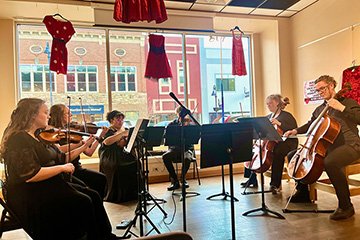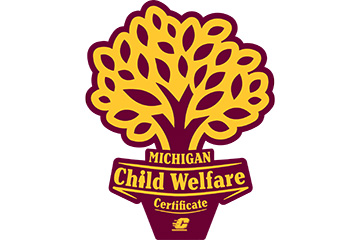Break our games
Students, educators and game developers gather monthly to test new games and classroom tools
The Center for Learning through Games and Simulations’ monthly Break Our Games event brings together students, educators and game developers to playtest games, evaluate their mechanics, and offer feedback to enhance both the entertainment value and educational effectiveness. The events take place every second Friday at Central Michigan University’s Park Library.
CLGS is dedicated to advancing games and simulations as transformative tools for teaching and learning. By fostering partnerships between educators, students and professional game designers, the center creates engaging and impactful educational experiences that go beyond traditional classroom methods. Its mission includes supporting the development of games that are not only fun, but also aligned with diverse learning objectives.
The most recent Break Our Games session brought together students, faculty, and industry professionals to test prototypes in various stages of development.
Jacob Way, CEO of Michigan-based game publisher Friendly Skeleton, showcased several games, including a dice-rolling prototype designed for quick, easy and replayable gameplay.
“I came hoping to have people join the game to see what kinds of improvements could be made. I want players to stay engaged even after they’re out,” said Way.
The testers shared ideas like adding trading or sabotage mechanics to keep players involved, praised the game’s fun, competitive tension, and offered actionable suggestions for refining its mechanics.

Exploring ecology and education
Department of Chemistry and Biochemistry faculty member Anja Mueller recently led a food web game developed by a colleague to teach Great Lakes ecology to middle school students. A four-person group of players put themselves into the shoes of young learners and carefully reviewed the intended mechanics, asked thoughtful questions, and identified opportunities to balance competition while aligning gameplay with educational goals.
CLGS co-director Jon Truitt says games have a unique power to transform learning by making it interactive, engaging and memorable.
“Whether in classrooms or corporate training sessions, they create a space where participants actively explore concepts, apply knowledge and build critical thinking skills in ways traditional methods can’t always achieve,” said Truitt. “By tapping into the natural human drive to play, we can connect with learners of all ages and foster deeper, more meaningful engagement.”
Addressing privilege and resilience through play
CLGS also shared Commonality, an internally developed game that addresses issues of discrimination and privilege through cooperative play. In reaction to campus events last spring, the game explores the harms of racism and themes of resilience and privilege across dimensions such as race, gender and socioeconomic status.
“We reached out to game designers Damon Stone and Eloy Lasanta to see if they would take on the challenge of creating this game,” said Truitt. “With support from CLGS co-director Tracy Davis, they crafted the game’s core loop. Since then, they have continued to build and refine the game. We continue to help through playtesting and trying to balance the complexity of the topic with accessibility for players.”
“Our focus is simplifying the mechanics so the themes can take center stage,” added Davis. “It’s a lot to fit into one game, but we believe it’s worth the effort to make these important topics approachable and engaging.”
Building better games together
Participants noted that the event’s collaborative atmosphere was a key element of its success.
“It’s great to hear laughter and see everyone working together to improve these games,” said Davis.
The next Break Our Games session is scheduled from 3 to 5 p.m. December 13 in Park Library Room 211. The event is free and open to all, including educators and community members interested in game development or pedagogy.
For more information, contact Jon Truitt at truit1jg@cmich.edu or Tracy Davis at davis5t@cmich.edu.




